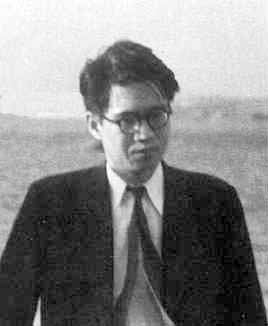<Back to Index>
- Mathematician Yutaka Taniyama, 1927
- Sculptor François Auguste René Rodin, 1840
- French Admiral Louis Antoine comte de Bougainville, 1729
PAGE SPONSOR

Yutaka Taniyama (November 12, 1927 – November 17, 1958) was a Japanese mathematician known for the Taniyama-Shimura conjecture.
Taniyama was best known for conjecturing, in modern language, automorphic properties of L-functions of elliptic curves over any number field. A partial and refined case of this conjecture for elliptic curves over rationals is called the Taniyama-Shimura conjecture or the modularity theorem whose statement he subsequently refined in collaboration with Goro Shimura. The names Taniyama, Shimura and Weil have all been attached to this conjecture, but the idea is essentially due to Taniyama.
In 1986 Ribet proved that if the Taniyama-Shimura conjecture held, then so would Fermat's last theorem, which inspired Andrew Wiles to
work for a number of years in secrecy on it, and to prove enough of it
to prove Fermat's Last Theorem. Due to the pioneering contribution of
Wiles and the efforts of a number of mathematicians the
Taniyama-Shimura conjecture was finally proven in 1999. The original
Taniyama conjecture for elliptic curves over arbitrary number fields
remains open, and the method of Wiles and others cannot be extended to
provide its proof. On November 17, 1958, Taniyama committed suicide. He
left a note explaining how far he had gotten with his teaching duties,
and apologizing to his colleagues for the trouble he was causing them.
His mystifying suicide note read: Until
yesterday I had no definite intention of killing myself. But more than
a few must have noticed that lately I have been tired both physically
and mentally. As to the cause of my suicide, I don't quite understand
it myself, but it is not the result of a particular incident, nor of a
specific matter. Merely may I say, I am in the frame of mind that I
lost confidence in my future. There may be someone to whom my suicide
will be troubling or a blow to a certain degree. I sincerely hope that
this incident will cast no dark shadow over the future of that person.
At any rate, I cannot deny that this is a kind of betrayal, but please
excuse it as my last act in my own way, as I have been doing my own way
all my life. Although
his note is mostly enigmatic it does mention tiredness and a loss of
confidence in his future. Taniyama's ideas had been criticized as
unsubstantiated and his behavior had occasionally been deemed peculiar.
Goro Shimura mentioned that he suffered from depression. Taniyama also
mentioned in the note his concern that some might be harmed by his
suicide and his hope that the act would not cast "a dark shadow over
that person." About
a month later, Misako Suzuki, the woman whom he was planning to marry,
also committed suicide, leaving a note reading: "We promised each other
that no matter where we went, we would never be separated. Now that he
is gone, I must go too in order to join him." After Taniyama's death, Goro Shimura stated that: He
was always kind to his colleagues, especially to his juniors, and he
genuinely cared about their welfare. He was the moral support of many
of those who came into mathematical contact with him, including of
course myself. Probably he was never conscious of this role he was
playing. But I feel his noble generosity in this respect even more
strongly now than when he was alive. And yet nobody was able to give
him any support when he desperately needed it. Reflecting on this, I am
overwhelmed by the bitterest grief.